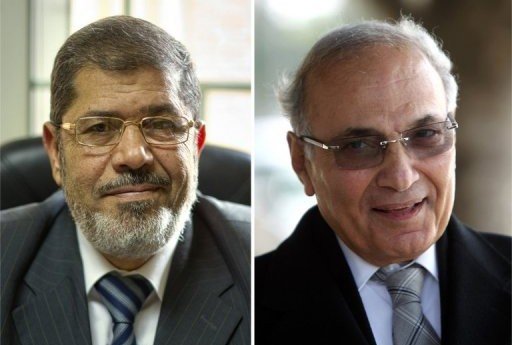
Egyptians will choose between Muslim Brotherhood’s candidate Mohammed Mursi and Ahmed Shafiq, a candidate from the Mubarak-era regime, when the presidential election goes to a run-off, state media confirm.
Mohammed Mursi has a slight lead on former PM Ahmed Shafiq with a reported 25.3% of votes against 24.9%.
The two represent forces that have battled each other for decades.
The second round in Egypt’s first free presidential polls is on 16-17 June.
Voting in the first round took place peacefully on Wednesday and Thursday.
The official results will be announced on Tuesday, but state media have been reporting tallies from polling stations around the country and have now confirmed the two frontrunners.
The vote was hailed as a historic achievement by international observers but many Egyptians – particularly supporters of the revolution – will find the choice they have been left with most unappealing.

A spokesman for the Muslim Brotherhood said Egypt would be “in danger” if Ahmed Shafiq won, and the group would reach out to other candidates to defeat him.
Warning of “determined efforts to recreate the old regime”, the Brotherhood urged parties that supported the uprising that overthrew Hosni Mubarak to unite around their candidate.
They have invited a range of opposition figures to a meeting on Saturday.
Both the Brotherhood and Shafiq campaigns have accused each other of “stealing” the revolution.
Ahmed Shafiq spokesman Ahmed Sarhan urged pro-revolutionaries to vote for his candidate, saying that while his programme was about “the future”, the Brotherhood’s was about “an Islamic empire”.
The polarized choice remaining in the run-off suggests Egypt could be entering a new period of confrontation.
Ahmed Khairy, spokesman for the Free Egyptians Party, a secular liberal party which emerged last year, said the outcome of the first round was “the worst possible scenario”, reported Egyptian newspaper al-Ahram.
He described Mohammed Mursi as an “Islamic fascist” and Ahmed Shafiq as a “military fascist”.
The pro-revolution vote was split, the reported results suggest, between leftist Hamdin Sabbahi (third with 21.5%) and a moderate Islamist who broke with the Brotherhood, Abdul Moneim Aboul Fotouh (fourth with about 19%).
Hamdin Sabbahi dominated in many urban areas, including Alexandria, local reports suggested.
Former Arab league chief Amr Moussa trailed in fifth place.
Mohammed Mursi and ahmed Shafiq represent very different strands of Egyptian society.
Mohammed Mursi is seen as belonging to a popular strand of political Islam that was excluded from the political process for many years under Hosni Mubarak.
Ahmed Shafiq, who served briefly as Hosni Mubarak’s prime minister, is regarded by many as a creature of the old secular regime.
Analysts say he drew his support from people fearful of an Islamist takeover, and those exhausted by the upheavals of the past 16 months.
About 50 million people were eligible to vote in the polls, in which 13 candidates were vying for the presidency.
It was the country’s first freely contested presidential election in its history, and observers said it had been conducted peacefully.
The military body that assumed presidential power in February 2011 – the Supreme Council of the Armed Forces (SCAF) – has promised a fair vote and civilian rule.
Until a new constitution is approved it is unclear what powers the president will have, prompting fears of friction with a military which seems determined to retain its powerful position.
Many Egyptians have grown frustrated with the pace of change in their country following the revolution, as the economy languishes, public services break down and crime levels rise.